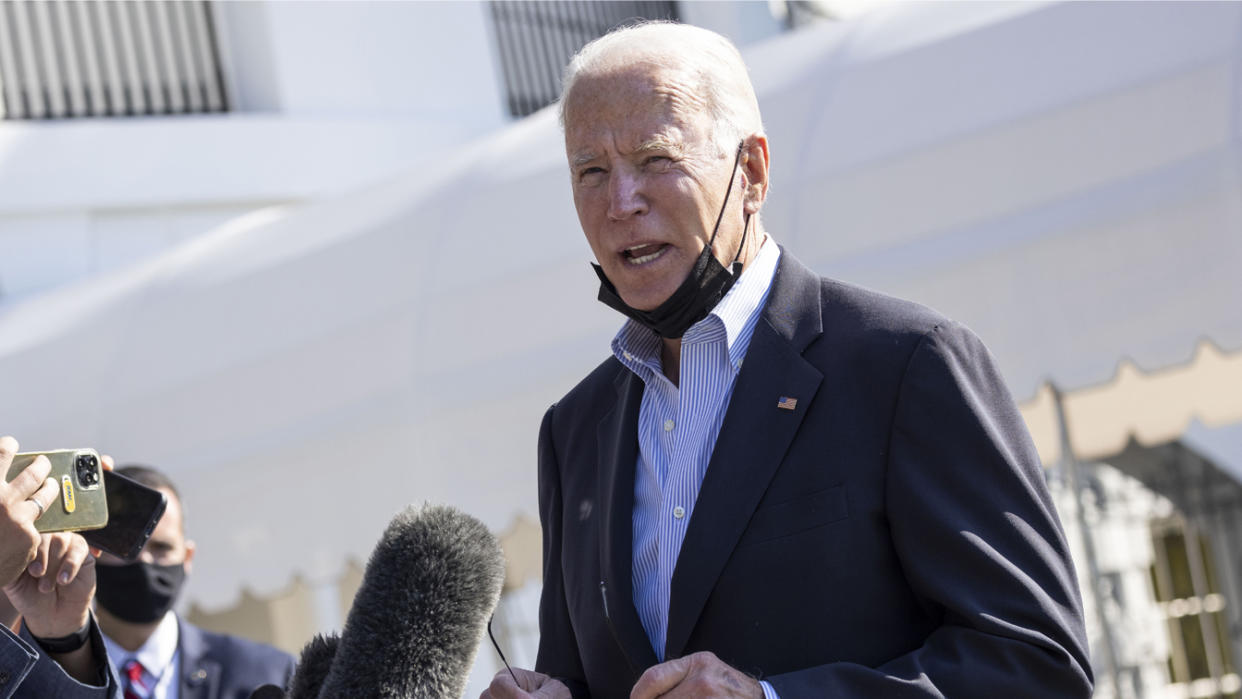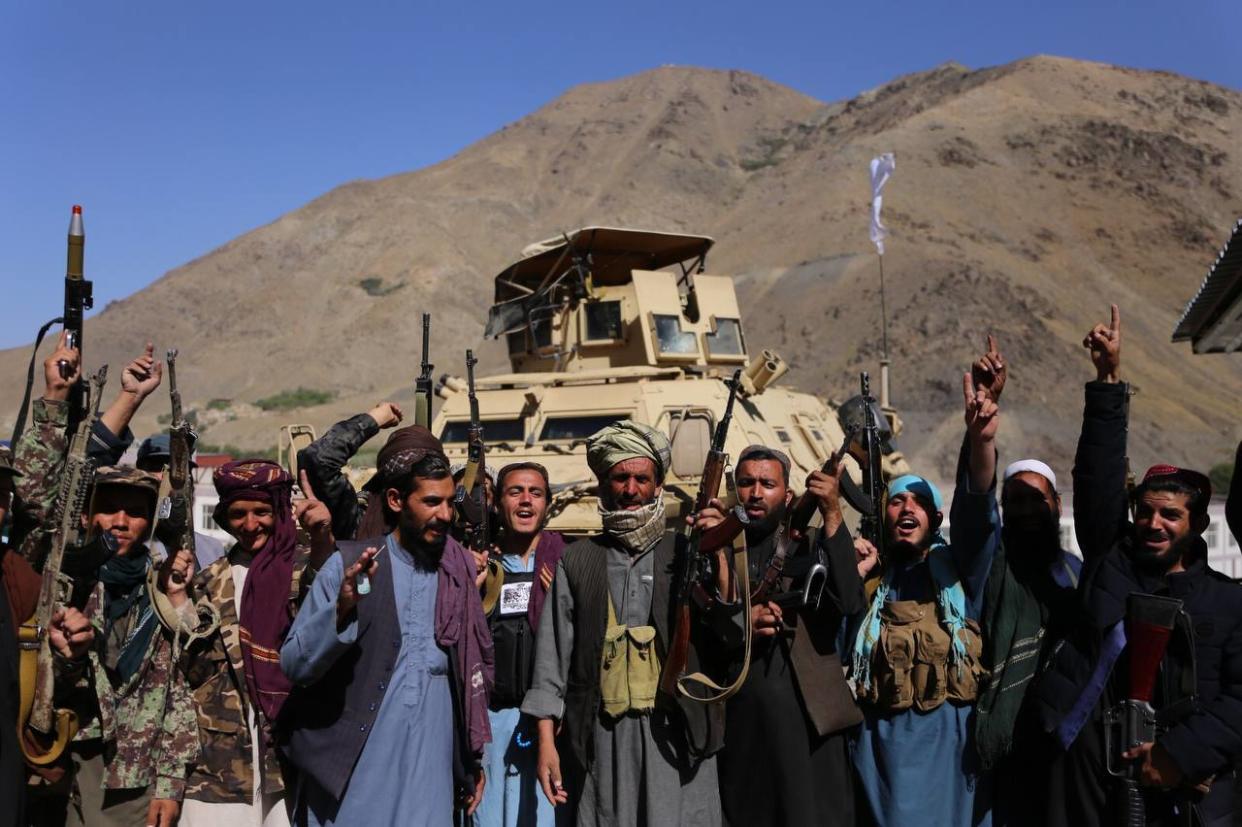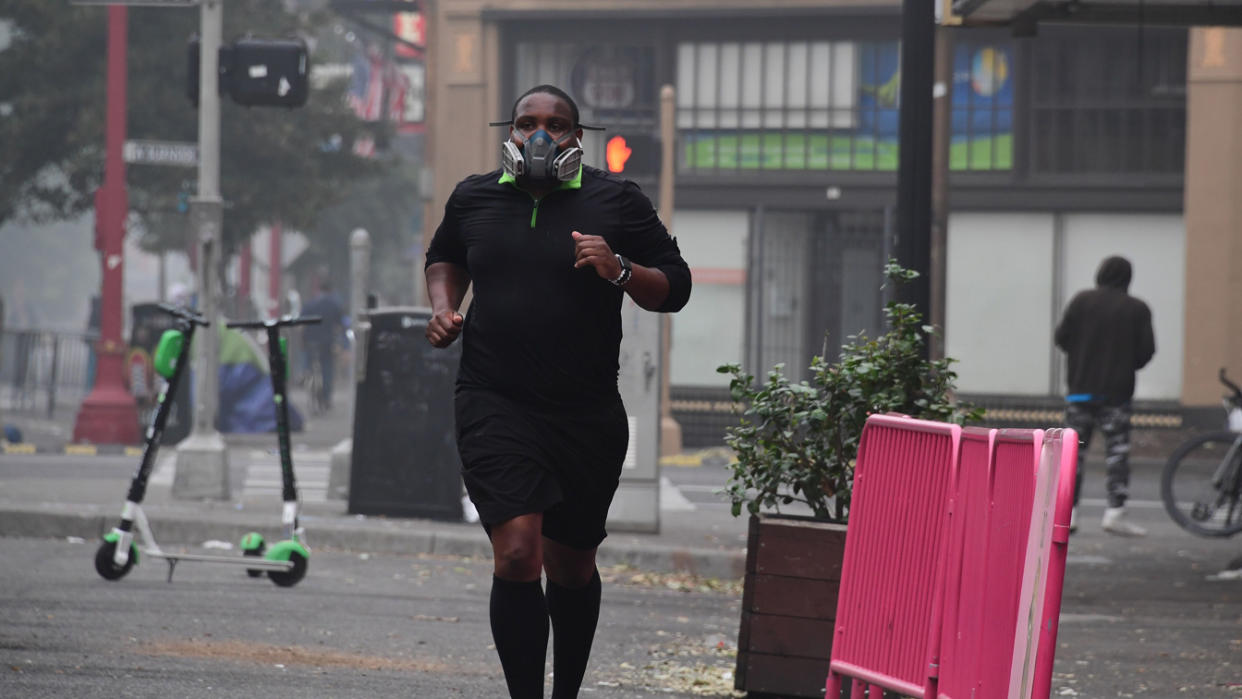The two mistakes that ruined Biden's summer
WASHINGTON — The disappointing employment figures that arrived last Friday were in some ways a symbolic capstone to a summer of disappointments for President Biden, most notable among them the force with which the Delta variant swept across the nation and the speed with which the Taliban swept across Afghanistan as U.S. forces withdrew.
Biden’s apparent miscalculations on the coronavirus and the Taliban have hurt his standing with the American public, sapping his administration of the upbeat, can-do spirit it had been hoping to carry into the fall.
“Biden’s Cruel Summer,” blared one recent headline. A “summer of freedom” from the coronavirus and a tidy conclusion to the war in Afghanistan never came to pass, and though it is debatable how much blame the White House deserves, there is little debate about where ordinary people place responsibility. For the first time since Biden assumed office, fewer Americans approve of the president than disapprove.

And, as pollster Frank Luntz warned, “Biden’s polling numbers are not done falling.”
The president, his top advisers and outside supporters believe that refocusing on the economy will not only lift the president’s standing but resound in real ways with real people. “He came into office wanting to show people that government could work for them again,” a senior administration official, who asked not be named, told Yahoo News.
“The public always believes that Presidents can control more than they can and sometimes punish them for things they can't control,” wrote Dan Pfeiffer, who served as a top adviser to Biden’s former boss Barack Obama, in an email to Yahoo News. “The good news for the Biden White House is that they have a huge opportunity to reclaim the narrative and assuage any concerns by passing their hugely popular economic agenda later this month.”
In the weeks to come, Congress will decide the fate of Biden’s $3.5 trillion human infrastructure proposal, as well as that of a smaller, bipartisan $1.2 trillion proposal focused on traditional infrastructure. If those measures pass, the White House believes, the summer’s challenges will quickly be relegated to a distant memory. “Our heads are down to get that across the finish line,” the senior administration official said, citing some 130 calls between the White House legislative office and members of Congress and their staffs.
He described the mood in the White House as “pretty upbeat” but “sober” about the challenges that remain. Biden’s predecessor, Donald Trump, was frequently occupied with day-to-day coverage of his administration, which often had the effect of turning problems into crises. The new president is taking the opposite approach, trying to stay focused on policy while keeping frustrations about media coverage largely private.

“There are times when events are larger than any president,” says Eric Dezenhall, a leading crisis communications expert in Washington who worked in the Reagan administration. “It’s not the messaging that’s the big problem; with Afghanistan, it’s the events and the notion that they could have been handled differently. We all know Afghanistan was a no-win situation, but there are core questions that are not being answered.”
Biden has struck a defiant tone on the withdrawal and has declined to fire officials like national security adviser Jake Sullivan, whom many hold responsible for the chaotic operation. Only 33 percent of Americans agree that Biden has handled the withdrawal well, with far more (55 percent) disapproving, according to a recent Yahoo News/YouGov poll.
“With Delta, Biden has greater moral authority,” Dezenhall told Yahoo News. But that authority, too, could slip as the pandemic looks to continue into the fall and, very likely, beyond. Unemployment benefits are expiring. Evictions loom. Offices remain closed and schools could close too. Last week’s lackluster employment report (only 235,000 new jobs added in August) only underscored the precariousness of the recovery.
Already, public approval of Biden’s pandemic response has dropped 10 percentage points since late June. Even though the Delta surge appears to have peaked, new variants are on the way. As in the earliest days of the pandemic, Americans are stockpiling toilet paper in fear of looming shortages.
Republicans who have struggled to define Biden now see an opening, pressing a case that is not entirely coherent but could prove politically effective all the same. Gov. Greg Abbott of Texas and Gov. Ron DeSantis of Florida have been fighting him on mask mandates in school, igniting a culture war that seemed to have died down in late spring. And former President Donald Trump has issued a dozen press releases in the last two weeks calling on Biden to resign over his handling of Afghanistan, a breach of post-presidential decorum that is nevertheless indicative of where conservatives stand.

Despite the right-wing caricature of a senescent president controlled by his advisers, Biden is well known to be impatient and to favor his own counsel over that of advisers, eager to show Ivy League-trained experts that they were wrong to dismiss him when he was vice president to the more erudite Obama. And he is acutely aware of the historical moment and the opportunities it presents, openly courting comparisons to transformational presidents like Franklin Roosevelt and Lyndon Johnson.
But the moment is also rife with dangers, as Biden has discovered in the last two months. In early July, he made two promises that would come undone in the weeks to come, leaving him in a weakened position.
On July 4, the White House had a party on the South Lawn. Some had advised against the affair, since the coronavirus pandemic was not over. Having hundreds of people gathering in the presidential backyard for burgers and blues music might make it seem like it was.
Biden went ahead with the party, because that was exactly the image he wanted to project, that the pandemic was being brought to its conclusion as a result of his determined leadership. The event was billed as “America’s Back Together,” maskless, vaccinated and no longer 6 feet apart.
“Today, we’re closer than ever to declaring our independence from a deadly virus,” the president said, making clear that victory was not yet complete, but coming ever closer, with fewer than 10,000 daily cases being recorded daily by the end of June, a precipitous drop from only six months before.

“We’ve gained the upper hand against this virus,” he added a few moments later. The pandemic, he said, “no longer controls our lives.” Then music began to play and the party began.
Four days later, Biden made another promise, this one on a very different topic. Trump had made an agreement with the Taliban in 2020 to pull U.S. military forces out of Afghanistan by 2021; but Biden, a longtime critic of the conflict, not only embraced that goal but accelerated the timeline. Now he was defending that decision, vowing that when the last American troops left, the government of Ashraf Ghani would assert his rule, with the help of the U.S.-trained Afghan National Army.
“The likelihood there’s going to be the Taliban overrunning everything and owning the whole country is highly unlikely,” the president said. There would be no airlifts of the kind Americans had seen at the dispiriting conclusion of the Vietnam War in 1975, he asserted.
Two months later, Biden appears to have made fateful miscalculations on both fronts. The Delta variant has reversed the progress the nation had made throughout the winter and spring, leading to a summer surge that has seen deaths and hospitalizations rise to levels not seen in months. Schools across the Southeast have shuttered. Corporations are telling people to stay home. Bars and restaurants are facing the crushing prospect of yet another pandemic winter.
In the White House, masks are back on, as they are in Los Angeles and many other parts of the country. Last month, Oregon became the first state in the country to reimpose an outdoor mask mandate, even for vaccinated people. Seattle recently followed suit.

“President Biden absolutely declared a victory too soon,” Dr. Leana Wen, the former Baltimore health commissioner, told Yahoo News last month. Since then, his administration has struggled to formulate a coherent approach — and message — on vaccine booster shots, the necessity of which is in dispute.
Dr. Kavita Patel, a Brookings Institution fellow who served as a health policy expert in the Obama administration, thinks that Biden made no “obvious mistakes” but adds that his administration could have provided clearer guidance to schools in July. She also thinks the Biden administration could be doing more to gather data on breakthrough infections and long-haul COVID while also creating a nationwide vaccine registry.
“He’s trying to convey that we’re not out of this pandemic without terrifying the country,” says Dezenhall, the D.C.-based crisis manager.
Biden could only do so much to control the spread of the Delta variant. He and his top advisers knew that it was coming, and that it would lead to a surge similar to the one that the United Kingdom experienced through the spring. Nor did they have any obvious means to temper the weariness of an American public eager to get on with ordinary life.
The same could be said for Afghanistan, a two-decade war of which the American public had grown unambiguously tired. As vice president to Barack Obama, Biden had opposed surging troops there. He and Trump may agree on little else, but they share an antipathy to military intervention without end.

“I’m sympathetic to where Biden found himself,” says Eurasia Group founder Ian Bremmer, but he faults the administration for “a very serious failure of planning.”
Little seemed to prepare the White House for the swiftness with which the Afghan military collapsed in the face of a determined Taliban advance. Ghani, the president, fled Kabul, leading to the rapid collapse of the central government. The images of Afghans clinging to the wheels of American aircraft were exactly what Biden had promised to avoid.
“The Afghanistan story will have legs,” Bremmer believes. “It is much bigger than Benghazi,” he adds, referencing the 2012 attack by militants on a U.S. consulate in Libya that left four Americans dead. Investigations into the attack hobbled the presidential prospects of Hillary Clinton, who was then the secretary of state.
The twin crises pummeled the White House at a vulnerable moment, as 61 percent of those polled said the country was headed down the wrong track.
On both issues, the White House believes it remains on firm footing. Polls are snapshots, and narratives change quickly in Washington. Biden would have liked to head into the fall with a stronger standing, and an infrastructure deal could have him riding high once more.
“President Biden has an enormous reserve of credibility,” says Celinda Lake, who conducted polling for Biden’s presidential campaign. “People agree with him on Afghanistan, and the images only convince American voters that the decision to withdraw and bring our troops and money home was the right one.”
Lake added that “voters still trust Biden on COVID more than anyone else. And voters see that COVID and the economy are strongly linked.”
The economy will be Biden’s top issue as members of Congress return to Washington and Afghanistan subsides, if only as a daily news story for U.S. outlets. Even as the president pushes for new spending, he has to be mindful of existing pandemic-related safety net programs now set to expire. On Tuesday, 7.5 million Americans stood to lose $300 unemployment payments. The federal eviction ban has also expired.

Consumer confidence plummeted in August to its lowest level since February, when Biden was a new president promising a new approach to end the pandemic. To a large degree, he has run that playbook as planned, only that has not been enough, and the coronavirus is still with us, maybe for months to come, maybe for years.
And there are always unexpected political crises. Just days before Labor Day weekend, Texas passed a restrictive new abortion law that bans the procedure after the sixth week of pregnancy and deputizes private citizens to sue abortion providers trying to circumvent the new law. There are growing concerns that the new Texas law will lead to the eventual overturning of the 1973 Supreme Court decision in Roe v. Wade, which legalized abortion.
“Any president has to be able to deal with many things at once. And that’s what we did during the month August,” the senior administration official said. He added that the president has always been clear-eyed about the scope of issues he’s been tasked with handling.
“There’s still work to do,” he acknowledged.
____
Read more from Yahoo News:


